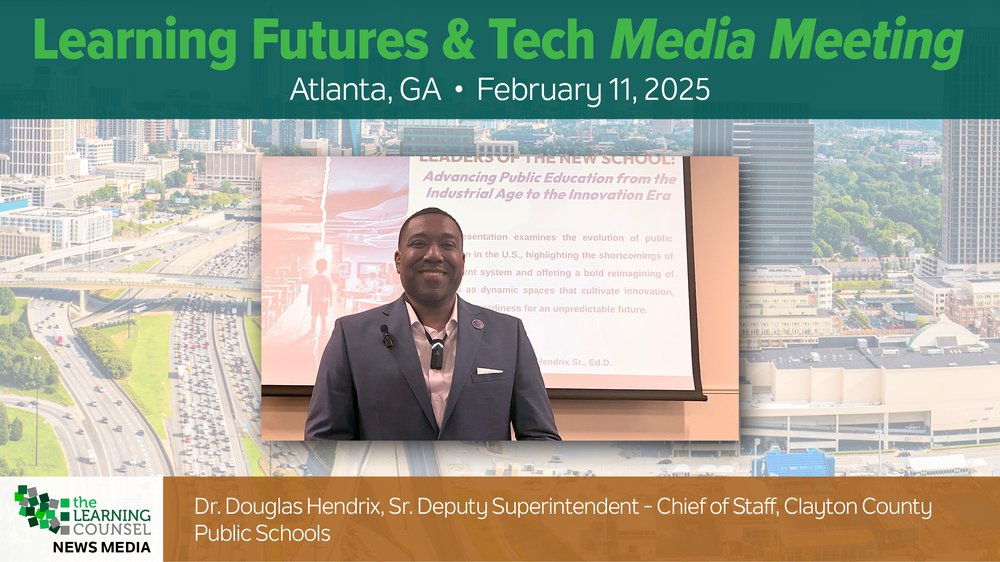At the Learning Futures & Tech Media Meeting in Atlanta, GA, Dr. Douglas Hendrix, Sr., Deputy Superintendent and Chief of Staff for Clayton County Public Schools, delivered a thought-provoking presentation on the urgent need for public education to evolve. Using historical context, technological evolution, and generational shifts, he made a compelling case that the current education system is built on outdated models that no longer serve today’s learners.
Dr. Hendrix began his presentation with a striking analogy: just as society has moved past Blockbuster to embrace Netflix and other streaming services, education must move past its industrial-age foundations.
“The contention that I make to you this morning is public education needs to do the same thing,” he stated. “We operate from an industrial-age model of education, and I believe I can prove it.”
His goal was not just to present information but to provoke thought: Are we where we want to be? Or do we need to evolve?
Dr. Hendrix traced the origins of public education back to the colonial period, when schooling was primarily focused on teaching people how to read the Bible and be subservient to authority. Education was exclusive, often led by religious leaders rather than trained educators.
Then came Horace Mann’s common school movement, which aimed to provide education for all children, laying the foundation for universal schooling. However, the real shift came with the 1847 Akron School Law, which introduced two key elements still shaping schools today:
- Grade-level grouping – The assumption that students of the same age have the same ability levels.
- The establishment of school boards – A governance structure that remains a defining feature of public education.
Dr. Hendrix argued that while these ideas were innovative for their time, they are now relics that fail to meet the needs of modern students.
One of the most compelling arguments Dr. Hendrix made was that schools today are still teaching students for the past rather than preparing them for the future.
“We need to empower our learners in different ways,” he asserted. “We need to stop teaching them what to think and start teaching them how to think.”
He criticized the focus on standardization and conformity, calling it "played out." Instead, he advocated for adaptive, personalized learning experiences that foster critical thinking, creativity, and innovation—skills that are far more relevant in today’s world.
Generational Shifts: Why Traditional Schooling No Longer Works
Dr. Hendrix broke down how education has historically catered to different generations, beginning with the Traditionalists and Baby Boomers, for whom the standardized model worked reasonably well.
However, as society evolved, so did the needs of students:
- Gen X and Millennials began to challenge traditional schooling, as technology and global connectivity reshaped the job market.
- Gen Z and beyond are growing up in a digital world, where skills like adaptability, digital literacy, and problem-solving are crucial.
Yet, despite these shifts, many schools continue to operate as if they are educating students for the 1950s, not the 2020s.
Dr. Hendrix closed his presentation with a call to action for educators and policymakers:
- Redesign education models to reflect modern learning needs, moving away from rigid grade-level structures.
- Focus on critical thinking and problem-solving rather than rote memorization and standardized conformity.
- Embrace technology and innovation the same way media, business, and entertainment industries have adapted to changing audiences.
Just as Marvel evolved from comic books to blockbuster films to reach a new generation, education must reinvent itself to remain relevant.
“If entertainment, business, and communication have all adapted to the digital age,” Dr. Hendrix challenged, “why is education still stuck in the past?”
His message was clear: education must undergo its own Netflix moment—before it becomes the next Blockbuster.
Tune in below to see the full presentation.











